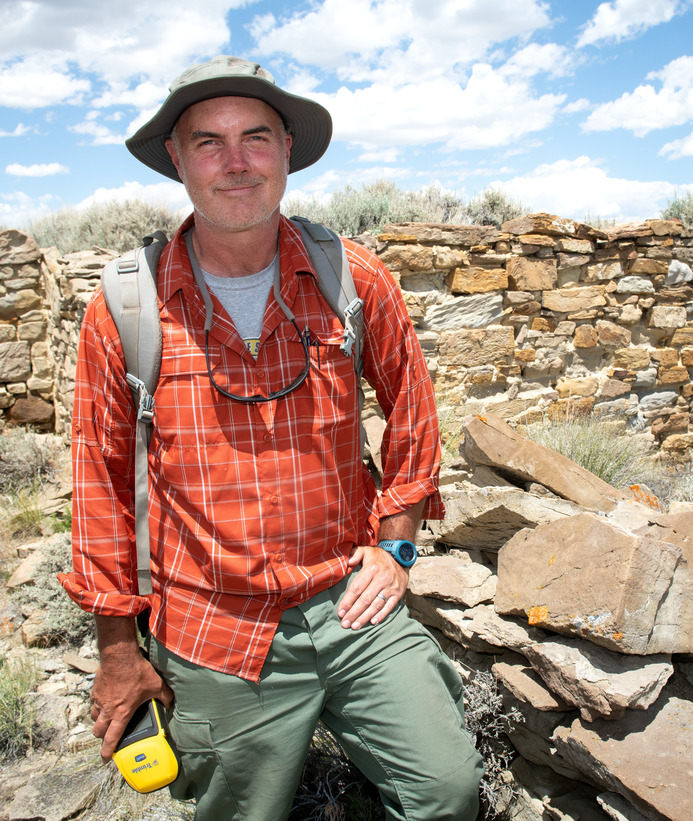About Anthropology's Graduate Programs
Small and intimate, our master’s in anthropology program offers ample opportunities for faculty-student research collaboration. This graduate degree program emphasizes a four-field approach in the tradition of American anthropology. Typically completed in two years, our master’s program in anthropology grants at least a semester of funding to all of our M.A. students, and we try to fund as many graduate students as we can.
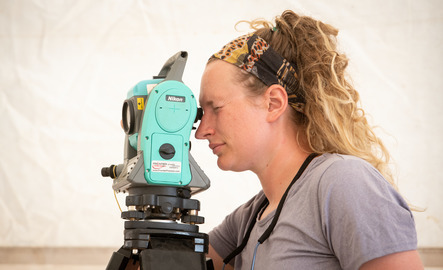
Our doctoral degree program, typically completed in three years, is also small and intimate, which creates a close-knit yet flexible academic environment to pursue your career and research interests. Our strengths lie in hunter-gatherer archaeology, Paleoindian archaeology and archaeology of the Rocky Mountain West and Plains. We are deeply committed to both our Wyoming-based research and our international programs — and often make strong connections between them.
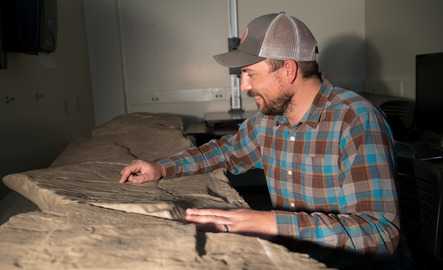
The anthropology master’s program curriculum at UW includes basic coverage of archaeology, biological anthropology, cultural anthropology and linguistic anthropology. The anthropology Ph.D. program at UW focuses on hunter-gatherer, Paleoindian and plains archaeology. These are just some of the classes you might take as a student in UW’s anthropology graduate programs:
- Lithic Analysis
- Zooarchaeology, Geoarchaeology or Bioarchaeology
- GIS in Anthropology
View M.A. in anthropology degree program curriculum.
View Ph.D. in anthropology degree program curriculum.
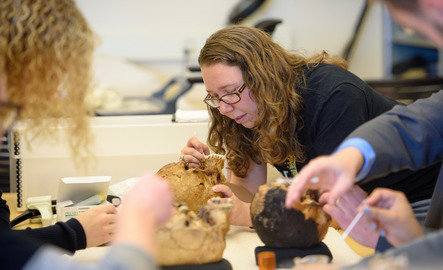
What Can You Do With an anthropology graduate degree?
Many of our M.A. graduates go on to careers in anthropology and archaeology. Most commonly, they work in cultural resource management, government or higher education. 90% of our Ph.D. graduates work in anthropology, with the majority of them building successful careers as academic professionals, including tenure-track faculty members and postdoctoral fellows.
- Anthropologist
- Archaeologist
- Professor
- Professional Researcher
- Museum Archivist or Curator
- Collections Manager or Laboratory Manager
There are plenty of opportunities for hands-on fieldwork! For example, two of our faculty members conduct research in Peru, focusing on the archaeology and biological anthropology of Andean complex societies. We also maintain strong connections with archaeologists in state and federal agencies, which have led to valuable research and employment opportunities for our graduate students.
Our faculty specialize in diverse regions including Iceland, Peru, Croatia and Native North America, with particular strengths in Paleoindian and hunter-gatherer archaeology, Wyoming’s history and biological anthropology.
The job outlook for anthropologists is growing, especially for those with advanced degrees and applied skills. Our program prepares students for success through hands-on experience and professional opportunities.
Learning Outcomes
- Students who graduate with a Ph.D. in anthropology from UW have professional and specialized training so that they can move into careers in academic or non-academic tracks.
- Students who graduate with a Ph.D. in anthropology from UW will have a dissertation research experience that results in professional publication(s), thereby contributing to the expansion of knowledge.
- Students who graduate with a Ph.D. in anthropology from UW will have practical experience that will promote their movement into professional careers in a reasonable amount of time.
Objectives Related to Learning Outcome 1
- Obj. 1. Doctoral students aided by the dissertation committee set up individualized programs of content courses, ensuring appropriate career track and specialization.
- Obj. 2. Students complete a college teaching experience, a course in anthropology's teaching and learning culture and a professionalism course to prepare for a possible academic career. Students teach at least one stand-alone course.
- Obj. 3. Students complete internship experience, K-12 or public education focus in course on teaching and learning and professionalism course to prepare for a possible non-academic career track.
- Methods of Assessment:
-
- Doctoral students create and maintain a teaching portfolio with self-evaluation and teaching evaluations. Faculty review of all teaching experiences.
- Doctoral students create and maintain an internship portfolio with self-report, evaluation, agency and supervisor evaluations, etc. Faculty review of all teaching experiences.
Objectives Related to Learning Outcome 2
- Obj. 1. Doctoral student engages in dissertation research projects, fieldwork and laboratory work under the supervision of the dissertation advisor.
- Obj. 2. Students apply for extramural funding, conduct original research and write at a publishable level.
- Obj. 3. Students submit at least 1 paper for peer-reviewed publication before graduation and present at least one paper at a regional/national conference.
- Methods of Assessment:
-
- Annual dissertation committee assessments of students' progress to discuss student progress in independent research, presentations, publications and the dissertation and track student involvement in collaborative efforts such as faculty-sponsored research and co-authored papers/articles.
- Doctoral students create and maintain a research portfolio/archive with research proposals, publications, papers, etc.
- Copies of submissions of proposals for funding (from the professionalism course) are maintained by the instructor in the course portfolio/archive.
Learning Outcomes
- Students who graduate with an M.A. in anthropology from UW will be able to explain the content of the "four fields" of anthropology and their interrelationship in written and oral formats.
- Students who graduate with an M.A. in anthropology from UW will have an experience in original research.
- Students who graduate with an M.A. in anthropology from UW will develop skills that foster professionalism as related to their chosen fields.
Objectives Related to Learning Outcome 1
- Obj. 1. Students learn basic content of each subfield in at least 1 course.
- Obj. 2. Students write a short paper presenting their thesis research and how it relates to the four fields of anthropology.
- Obj. 3. Students demonstrate competence and familiarity with the four fields by presenting their paper and thesis research before the faculty and department.
- Methods of Assessment:
-
- Students demonstrate knowledge of the interrelationship of subfields by writing a short paper, which is evaluated by a faculty committee using a rubric.
- Students demonstrate knowledge of subfield content by successful completion of an oral presentation as evaluated by a faculty committee using a rubric.
Objectives Related to Learning Outcome 2
- Obj. 1. Students develop, implement and complete their own Plan A or B projects.
- Methods of Assessment:
-
- Successful development and completion of Plan A or B projects.
- Graduation rates as determined for the annual report or data collected for the School of Graduate Education.
Objectives Related to Learning Outcome 3
- Obj. 1. Students give at least one lecture in classes for which they are the GA and/or conduct museum and site tours for the general public.
- Obj. 2. Students disseminate research results at professional conferences or other professional venues.
- Obj. 3. Students gain internship or work experience at federal or state agencies, private companies or in UW contracts, grants or research.
- Methods of Assessment:
-
- Students write applications for GA positions, which reflect on their teaching and research experiences and qualifications reviewed every semester by the entire faculty, at which students' past performance and experiences are discussed before positions are assigned.
- Students report to advisors about conference presentations and other professional activities, which are also recorded in the annual report and/or faculty update.
- Career tracking information is maintained by the department head.
UW Anthropology Making An Impact
Department of Anthropology Professor Todd Surovell received a National Science Foundation (NSF) grant to study how Clovis people lived at the La Prele Mammoth site near Douglas in Converse County, which will help answer questions about human adaptation to environments during the ice age.
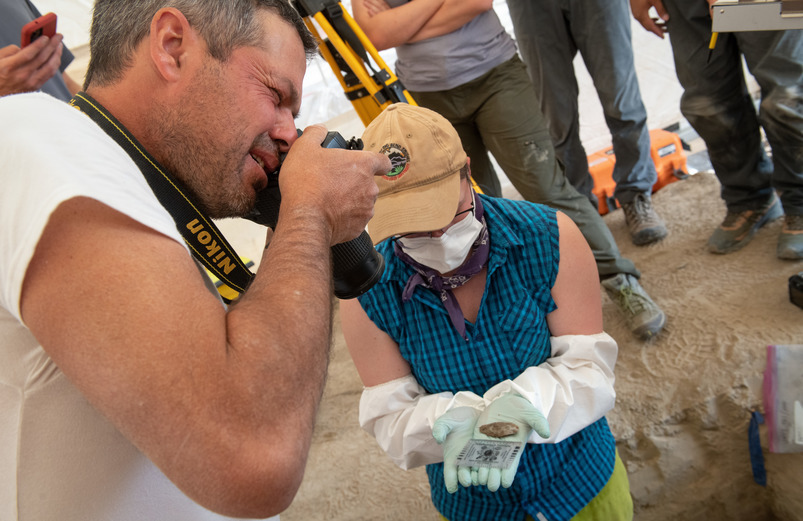
“The advising and research opportunities I received while at UW were integral in my successfully landing a tenure-track position. Faculty in the UW Anthropology Department work closely with their students to ensure they are training strong scholars and future peers. Hands-on research experience, such as field and lab work opportunities, and practical job preparation through courses like the Professionalism class create a balanced approach to academics and made me feel ready to tackle a competitive job market."
- Heather Rockwell | ’14 University of Wyoming, Ph.D. in Anthropology | Assistant Professor, Salve Regina University

